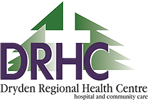- Home
- |
- About
- |
- Patients & Visitors
- |
- Programs & Services
- |
- Careers/Volunteer
- |
- Donate
- |
- 50/50 Draw
- |
- COVID-19
- |
- News
- |
- Contact
Rehabilitation Services
The Rehabilitation Department is staffed by 6 physiotherapists, 4 occupational therapists, 2 rehabilitation assistants and 1 rehabilitation clerk.
Occupational Therapists (OTs) work with people who are affected by injury or disease to help them improve their ability to function in their daily lives. OT can assess the need for equipment such as wheelchairs and walkers and can fabricate splints. They can suggest alternative ways of carrying out daily activities, assess living spaces to ensure accessibility and functional living.
Physiotherapists work with people who are affected by injury or disease to improve movement and function and reduce pain. Physiotherapists use exercise, joint movement and modalities as heat, ultrasound, TENS and acupuncture to accomplish the patient's goals.
The Physiotherapists and Occupational therapists assess and treat patients who are in the hospital, outpatients and people in their homes.
Hours & Contact Information
- Hours: 8:00 to 4:00 (closed from 12:00 - 1:00)
- Location: Main floor, hallway between the inpatient unit and the cafeteria
- Phone: Phone: 223-8201 ext 1265
- Fax: 223-8478
Inpatients
Physiotherapists and occupational therapists are part of the care team for inpatients. The therapists assess the patient to identify the problems and set treatment goals with the patient. Patients, their families and therapists are partners in the treatment plan, along with other members of the healthcare team.
Outpatients:
Our Physiotherapy outpatient services provide care to clients with musculoskeletal (ie muscle, ligament, tendon, bone injuries), neurological (ie. stroke, MS, brain or spinal cord injuries) or cardiovascular ( ie. heart attacks, COPD, lung conditions). We see clients of all age groups and provide a wide variety of treatment.
Our Occupational Therapy outpatient services provide care to clients after surgery, patients with conditions affecting their mobility, patients needed bracing or splints.
Patient referrals are prioritized. It is our goal to see high priority clients within 10 business days. Some of those conditions that require treatment as soon as possible are: fractures, after cast removal, orthopedic surgeries, hand injury, recent strokes, severe sciatica or neck pain that radiates down the arm.
Clients with chronic pain or conditions that have persisted and are not changing rapidly are on a wait list for service.
Our Rehabilitation department also provides many different group classes:
Pulmonary Rehabilitation - This class is held in partnership with the Lung Health nurse at the Family Health Team. It is for clients with COPD and provides education classes and supervised exercise and runs for 6 weeks.
Cardiac Rehabilitation: If you have had a heart attack or cardiac surgery or have congestive heart failure you may be a candidate for cardiac rehabilitation. You need to have a referral from your family doctor or a cardiologist and are then assessed by our team. The class involves a supervised exercise program. The sessions are held twice a week for 1.5 hours and the program typically lasts for 3 months.
GLA:D Canada is an 8 week education and exercise program for those with osteoarthritis of the hips or knees. Classes are held twice a week and are 60 to 90 minutes. It will give you education about your condition and management strategies for your arthritis besides surgery.
Pelvic Floor Physiotherapy- This program addresses incontinence, prolapse, pelvic pain and peri-natal pelvic conditions.
The waitlist is too long: are there other options for rehabilitation service?
Physioquest at 156 Lakeside Drive is a private practice. Clients who have extended health benefits through their employer may consider this private practice. The phone number is 223-2732.
CRG Kinesiology Injury Rehabilitation and Ergonomic Services at 119 Grand Trunk Ave 220-0305
Is physiotherapy and occupational therapy covered by OHIP?
Yes, PT and OT services are covered by OHIP when provided in a hospital. These services are only available with a referral from a Doctor or Nurse Practitioner.
Do I need a doctor's referral to see a physiotherapist or occupational therapist?
Yes, you need a doctor's referral to attend PT or OT in the hospital. If you choose to see a therapist in private practice, you will not need a doctor's referral, but you will have to cover the costs yourself or through a private insurance plan. Some private insurance plans also require a doctor's referral.
Mobility equipment and the Assistive Devices Program (ADP)
Occupational Therapists assess clients who need mobility equipment such as walkers, wheelchairs or scooters. The therapist will determine which equipment will best meet the needs of the client, do a series of measurements and then write a funding application for that equipment if the person meets the eligibility requirements. These criteria are strict to access Ontario's grant program and ADP requires approval.
The therapist sends the application to the Ministry of Health and Long-term care for funding under the Assistive Devices Program.
If the application is approved, the ADP program will pay 75% of the cost of the equipment; clients are responsible for 25% of the cost.
Physiotherapy and Occupational Therapy in the home
The Dryden Regional Health Centre has a contract with the Home and Community Care Support Services North West to provide Physiotherapy and Occupational Therapy service to clients in their home in the communities of Dryden, Vermilion Bay, Sioux Lookout, Ignace, Lac Seul and surrounding areas.
Is there a fee for home care services?
There are no fee for these services.
How do I access physiotherapy or OT in my home?
Patients can call the Home and Community Care Support Services North West Intake directly to arrange for service (1-877-661-6621). Patients can be self-referred or by a health care professional.
BP.O. Box 3003, 58 Goodall Street, Dryden, Ontario, Canada, P8N 2Z6 Apatientrelations@drhc.on.ca x807-223-8200 TTY807-223-8295 * ^
Contact Us
P.O. Box 3003, 58 Goodall Street
Dryden, Ontario, Canada, P8N 2Z6
x807-223-8200 TTY807-223-8295
Apatientrelations@drhc.on.ca

